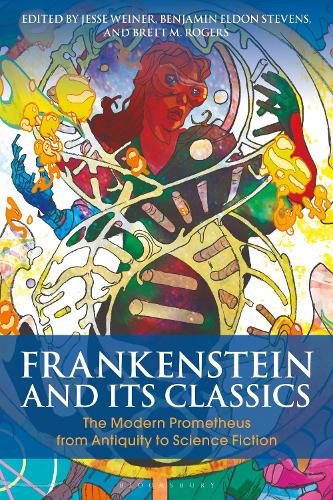
Frankenstein and Its Classics: The Modern Prometheus from Antiquity to Science Fiction
(Paperback)
Available Formats
Publishing Details
Frankenstein and Its Classics: The Modern Prometheus from Antiquity to Science Fiction
By (Author) Jesse Weiner
Edited by Benjamin Eldon Stevens
Edited by Brett M. Rogers
Bloomsbury Publishing PLC
Bloomsbury Academic
9th August 2018
United Kingdom
Classifications
Tertiary Education
Non Fiction
Literary studies: c 1800 to c 1900
Classic science fiction
809.38762
Physical Properties
Paperback
288
Width 156mm, Height 232mm, Spine 16mm
440g
Description
Frankenstein and Its Classics is the first collection of scholarship dedicated to how Frankenstein and works inspired by it draw on ancient Greek and Roman literature, history, philosophy, and myth. Presenting twelve new essays intended for students, scholars, and other readers of Mary Shelleys novel, the volume explores classical receptions in some of Frankensteins most important scenes, sources, and adaptations. Not limited to literature, the chapters discuss a wide range of modern materialsincluding recent films like Alex Garlands Ex Machina and comics like Matt Fractions and Christian Wards Ody-Cin relation to ancient works including Hesiods Theogony, Aeschyluss Prometheus Bound, Ovids Metamorphoses, and Apuleiuss The Golden Ass. All together, these studies show how Frankenstein, a foundational work of science fiction, brings ancient thought to bear on some of todays most pressing issues, from bioengineering and the creation of artificial intelligence to the struggles of marginalized communities and political revolution. This addition to the comparative study of classics and science fiction reveals deep similarities between ancient and modern ways of imagining the worldand emphasizes the prescience and ongoing importance of Mary Shelleys immortal novel. As Frankenstein turns 200, its complex engagement with classical traditions is more significant than ever.
Reviews
All together, these wide-ranging yet often impressively nuanced essays expand our knowledge of the ways in which the Frankenstein story brings ancient thought to bear on modern concerns in literary, philosophical and cultural terms, and much else besides. * Bryn Mawr Classical Review *
This fascinating and accessible collection of essays takes the opportunity offered by the bicentennial of Frankensteins original publication to look both back and forward ... It raises important questions about the role of the Humanities, and indeed, on an even grander scale, what it means to be human. * Classics for All *
These interesting essays discuss not just the classic novel, but also some its many offspring adaptations. It uses them as a springboard into relevant modern issues like bioengineering and artificial intelligence. This is the sustenance of the reader who likes to deep-dive into literature. * Kirkus *
Frankensteins patchwork of classical allusions were as diverse and uncanny as the monster itself. Putting Prometheus back into the promethean, this timely and exciting volume shows how classical mythology, refracted through Frankenstein, shapes ethical debates prompted by technological and scientific advances today. * Jennifer Wallace, Harris Fellow and Director of Studies in English, Peterhouse, University of Cambridge, UK. *
This highly scholarly, yet very accessible, collection grounds the original Frankenstein and adaptations of it in numerous ancient Greco-Roman sources, some for the first time and all with a revealing thoroughness unavailable until now. * Jerrold E. Hogle, Professor of English and University Distinguished Professor, University of Arizona, USA. *
The scholarship of the contributors is evident throughout this volume, which combines new approaches to Frankenstein with new contexts. The volume concludes with a useful list of works inspired by the novel. * International Journal of the Classical Tradition *
Author Bio
Jesse Weiner is Visiting Assistant Professor of Classics at Hamilton College, USA. Benjamin Eldon Stevens is Visiting Assistant Professor of Classics at Trinity University, USA. Brett M. Rogers is Associate Professor of Classics at the University of Puget Sound, USA.
